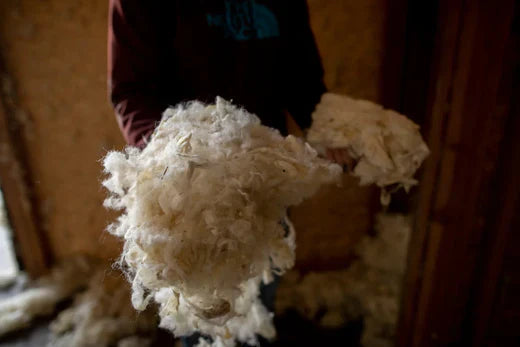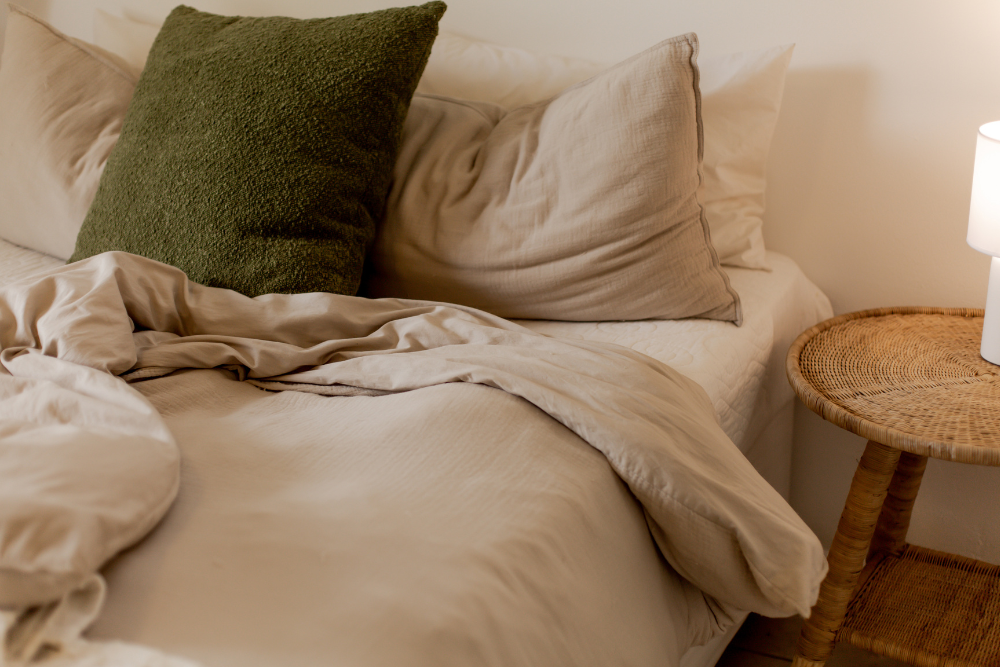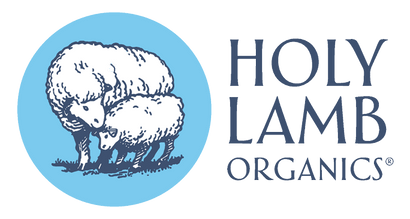Add description, images, menus and links to your mega menu
A column with no settings can be used as a spacer
Link to your collections, sales and even external links
Add up to five columns
Add description, images, menus and links to your mega menu
A column with no settings can be used as a spacer
Link to your collections, sales and even external links
Add up to five columns
The Life Cycle of Our Wool: From Farm to Bedroom
enero 15, 2025 4 lectura mínima

At Holy Lamb Organics, we are committed to transparency and sustainability. Our Premium Eco Wool and Certified Organic Wool products are a testament to this, crafted with ethically sourced wool that has been handled with care at every step of the journey!
Let’s take a closer look at the life cycle of our wool, from the farm to your bedroom.
1) Ethical Sheep Farming
It all begins at the farm! We use Premium Eco Wool, which comes from small, family-run farms in the Pacific Northwest that practice ethical and sustainable farming methods, as well as GOTS-certified Organic Wool from New Zealand. They are processed in the same wool mill in northern California.
The sheep are raised in environments that prioritize their well-being. They graze freely on pesticide-free pastures, and their wool is sheared using humane practices. We only work with farms that adhere to strict animal welfare standards, ensuring that the sheep are treated with respect throughout their lives!
Wool Growing Practices We Oppose:
- Dipping: At many conventional farms, all sheep are subject to a bath in a pesticide solution. Our farms use a more holistic approach.
- Harmful Shearing: We work with highly skilled shearing crews to make this process as quick and harmless as possible.
- Mulesing: Cutting patches of skin off sheep (to discourage infection and flies from laying eggs in the folds) is used primarily with Australian Merino sheep. None of our growers ever practice this method.
- Overgrazing: In addition to harming the land, overgrazing lowers overall wool quality. More invasive plants begin to grow and can increase the amount of vegetable matter in the wool. More vegetable matter often makes more extreme processing techniques necessary.
Our Wool Growing Criteria:
- Proper Grazing Methods: Our growers rotate sheep to different pastures to allow vegetation to recover from grazing. Our wool also comes from farms that do not overstock their pastures. Overstocking and infrequent rotation produces soil erosion, higher amounts of invasive plants, and the need to bring in outside feed. Proper grazing techniques reduce soil erosion, create higher quality wool, and reduce the risk of sheep acquiring internal parasites.
- Predator-Friendly: We encourage our growers to use trained sheep guardian dogs (rather than trapping, poisoning, or shooting) and the inclusion of other larger animals (such as llamas) to protect their flocks from predators. Predators play an important role in maintaining healthy ecosystems.
- Healthy Veterinary Practices: Only certain kinds of medications and supplements can be used to treat Eco-sheep. We encourage alternative caring methods to keep sheep healthy with fewer chemicals. Generally, sheep raised in open pastures are healthier and require less veterinary care.
- Chemical Control: We oppose the use of herbicides and pesticides on fields where sheep will be grazing. We are able to determine if wool has been in contact with harmful chemicals through random spot-testing.
- Specifications for Breed, Color, Strength, and Micron-Width: Our wool blends use wool from six to eight different breeds of sheep. Our blends are chosen to create strong, durable wool batting that retains its loft and resiliency longer. We use a mix of coarse and finer wools with varying crimps to achieve our special batting.
- Skirting: Skirting is the process of removing less desirable wool from the belly and rear of the sheep. This wool is separated on a skirting table and sold to other clients. Our wool is skirted at the time of shearing and checked again at the washing facility.

2) Sustainable Wool Processing
After shearing, the raw wool is carefully processed without the use of harmful chemicals. We avoid synthetic detergents, bleaches, and dyes, ensuring that the wool retains its natural properties. The wool is washed with eco-friendly soap, preserving its lanolin, a naturally occurring wax in sheep's wool that gives it many of its benefits. This means that your wool bedding not only helps maintain a healthy sleep environment, but also regulates temperature.
Common Wool Processing Practices We DO NOT Use:
- Carbonizing: Wool fibers are dipped in strong acids to dissolve residual vegetable matter.
- Chemical Crimping: After carbonizing, wool fibers are unnaturally straightened and require a chemical “perm” to regain their coiled, crimped structure.
- Bleaching: In order to get the purest whites and brightest colors, most wool fibers are bleached and dyed. Our batting is the color of natural white wool.
3) Crafting High-Quality Products
Once processed and carded, the wool batting is hand-crafted into our luxurious bedding products! Each piece, from our organic wool comforters to pillows and mattress toppers, is made with care. We build them by hand in Oakville, WA, in the historic Little Bit General Store.
Our team of skilled artisans uses time-honored techniques to ensure that every item is durable, comfortable, and sustainably produced. We believe in crafting products that are not only beautiful and functional, but also kind to the planet.

4) Eco-Friendly Packaging and Delivery
Our commitment to sustainability extends beyond the production process, because that’s not where the journey ends! We use minimal, eco-friendly packaging to reduce waste, using only cardboard boxes - or reusing plastic wrap from our supply chain to protect mattresses during shipment.
Our packaging materials are recyclable or compostable, ensuring that they don’t contribute to environmental harm. From the farm to your doorstep, every part of our supply chain is designed with sustainability in mind.
5) A Product That Gives Back
When you invest in wool bedding, you’re not just buying a product—you’re supporting a sustainable way of life. You’re helping to protect ecosystems, promote ethical farming, and reduce environmental impact. Wool is naturally biodegradable, meaning it returns to the earth without leaving a lasting footprint, unlike synthetic materials that take decades to decompose.
At Holy Lamb Organics, we are proud of our transparent, eco-conscious supply chain! By choosing our products, you are contributing to a sustainable future while enjoying the comfort and benefits of all-natural bedding.
1 Respuesta
Dejar un comentario
Los comentarios se aprobarán antes de mostrarse.
Ver artículo completo

Love Your Sleep: Why Quality Rest is the Ultimate Act of Self-Care
febrero 12, 2026 3 lectura mínima
February is often associated with outward expressions of love through cards, gifts, and grand gestures. But one of the most meaningful ways to care for yourself and those you love doesn’t come wrapped in a box. It starts at night.

How Natural Bedding Supports Better Sleep in the New Year
enero 14, 2026 4 lectura mínima
As a new year begins, many of us look for ways to reset. One of the most powerful (and often overlooked) ways to support overall well-being is through better sleep.

Organic Luxury for Cooler Nights
octubre 14, 2025 3 lectura mínima
As the days grow shorter and the air takes on that familiar crispness, fall gently nudges us to slow down. And there’s no better way to embrace this shift than by transforming your bedroom into a sanctuary of warmth and rest.
Subscribe
Sign up to get the latest on sales, new releases and more …

Carol L
febrero 20, 2025
Thank you for being so transparent about your wool!